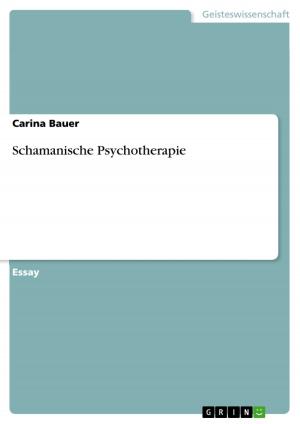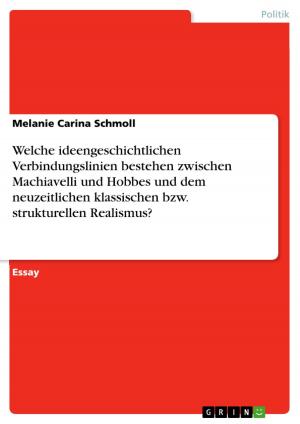Totalitarianism - The Concept and the Controversies Underlying It
The Concept and the Controversies Underlying It
Nonfiction, Social & Cultural Studies, Social Science, Sociology| Author: | Peter Brüstle | ISBN: | 9783638332736 |
| Publisher: | GRIN Verlag | Publication: | December 17, 2004 |
| Imprint: | GRIN Verlag | Language: | English |
| Author: | Peter Brüstle |
| ISBN: | 9783638332736 |
| Publisher: | GRIN Verlag |
| Publication: | December 17, 2004 |
| Imprint: | GRIN Verlag |
| Language: | English |
Seminar paper from the year 2003 in the subject Sociology - Political Sociology, Majorities, Minorities, grade: A- (82), University of British Columbia (Dept. of Sociology), course: Seminar 'Political Sociology', 10 entries in the bibliography, language: English, abstract: Since its coinage in the 1920's the term 'totalitarianism' has adopted various connotations and has lead to highly controversial discussions in a multitude of scientific texts. Created by the opposition of Italian fascism, it is soon taken up by Mussolini himself. After the end of the Second World War, Hannah Arendt and Carl J. Friedrich write two standard works, that classify both Nazism and Stalinism as totalitarian regimes. In the following cold war period the term develops into an ideological catchword of the Right, which culminates in the equation of the crimes of Communism with the Holocaust in the 'Historikerstreit' in 1986. Recently, after the collapse of soviet Communism, the term is rediscovered as a useful tool to classify and compare political systems. In the following pages, I will therefore discuss the general concept of totalitarianism and the socio-historic causes for the rise of totalitarian regimes in the 20th century with the help of the classic theories of Hannah Arendt, Carl J. Friedrich and Karl D. Bracher. Further on I will deal with some of the criticism that the theory of totalitarianism was confronted with and show the benefit of the concept for scientific discourse. In view of the flood of theories and criticism, it is not possible for me, to comment on the debate on totalitarianism as a whole. Instead I will concentrate on some of the crucial arguments of the debate, being aware that certain aspects will be left out in my discussion.
Seminar paper from the year 2003 in the subject Sociology - Political Sociology, Majorities, Minorities, grade: A- (82), University of British Columbia (Dept. of Sociology), course: Seminar 'Political Sociology', 10 entries in the bibliography, language: English, abstract: Since its coinage in the 1920's the term 'totalitarianism' has adopted various connotations and has lead to highly controversial discussions in a multitude of scientific texts. Created by the opposition of Italian fascism, it is soon taken up by Mussolini himself. After the end of the Second World War, Hannah Arendt and Carl J. Friedrich write two standard works, that classify both Nazism and Stalinism as totalitarian regimes. In the following cold war period the term develops into an ideological catchword of the Right, which culminates in the equation of the crimes of Communism with the Holocaust in the 'Historikerstreit' in 1986. Recently, after the collapse of soviet Communism, the term is rediscovered as a useful tool to classify and compare political systems. In the following pages, I will therefore discuss the general concept of totalitarianism and the socio-historic causes for the rise of totalitarian regimes in the 20th century with the help of the classic theories of Hannah Arendt, Carl J. Friedrich and Karl D. Bracher. Further on I will deal with some of the criticism that the theory of totalitarianism was confronted with and show the benefit of the concept for scientific discourse. In view of the flood of theories and criticism, it is not possible for me, to comment on the debate on totalitarianism as a whole. Instead I will concentrate on some of the crucial arguments of the debate, being aware that certain aspects will be left out in my discussion.















